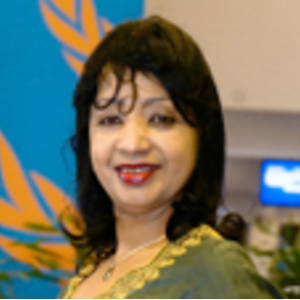Virtual classroom takes learners on a tour of Ecosystem Restoration across South Africa.
03 June 2021
South Africa is the third most biodiverse country in the world due to its species diversity, rate of endemism and diverse ecosystems, home to over 95,000 known species. Yet its natural spaces are greatly threatened by human activity.
United Nations Environment Programme (UNEP) in partnership with Western Cape Government, CapeNature and Wildlife and Environment Society of South Africa (WESSA) will launch a Virtual Ecosystem Classroom that takes learners on a journey across three revived landscapes in the country.
The video for the Virtual Ecosystem Classroom will be launched on World Environment Day that will be celebrated on 5th June 2021 on UNEP Africa Office’s YouTube channel.
This event comes on the eve of the United Nations Decade on Ecosystem Restoration, a 10-year push to revive the natural world that launches on World Environment Day. Ecosystem degradation is already affecting the well-being of at least 3.2 billion people – 40 per cent of the world’s population. Most school children in South Africa learn about ecosystems – like wetlands, rivers and other biodiverse areas - in the classroom. Using video and animation technology, a webisode entitled “Ecosystem Restoration Classroom | #GenerationRestoration”' will take learners to three restored sites namely; the Berg River catchment, Groenvlei in the Goukamma Nature Reserve and Twinstreams between the uMlalazi and Amatigulu estuaries in Zululand, Kwazulu-Natal. Each of these sites will showcase a different aspect of Ecosystem Restoration activities.
“Involving youth in restoration activities helps foster local action and global commitments to sustainable development,” said Cecilia Kinuthia-Njenga, Head of the UN Environment Programme Office in South Africa, adding that “All children have a human right to be educated about nature and the challenges it is facing.”
The virtual classroom will cast a spotlight on the challenges faced by vulnerable ecosystems and aims to encourage students and the youth to understand how nature and our ecosystems provide the foundations for a healthy planet, and the role they can play to protect and nurture nature.
In response to COVID-19, the video-based initiative provides high-quality educational content –subtitled into three local languages -- featuring footage and interviews with experts in the field. The virtual Ecosystem Restoration Classroom targets over 1 000 primary schools and aims to empower students to be ecosystem ambassadors. The video will be uploaded to e-learning portals and shared via social media.
By learning from experts in the field, the initiative aims to educate youth on how to conserve and restore ecosystems for sustainable development.
South Africa is the third most biodiverse country in the world due to its species diversity, rate of endemism and diverse ecosystems, home to over 95,000 known species. Yet its natural spaces are greatly threatened by human activity. This has serious implications on the society and the economy whilst further disproportionately harming people living in vulnerable conditions. Watch the video on 5 June 2021 at 10am on the official World Environment Day website and UNEP Africa Office’s YouTube channel.

Meseret Teklemariam Zemedkun
Throughout her career at UNEP Africa Office, she has demonstrated professionalism in her work with Member States and she has exceptionally managed the implementation of major projects in several countries, including South Africa and other SADC countries. These include: ( i) Regional African Rift Geothermal Development Facility Project (ARGeo); (ii) Clean Captives installations for industrial clients in Sub Saharan Africa; (iii) Energy Access and Green Transition Programme; and (iv) Women Entrepreneurs and Sustainable Energy in Africa.
She has also been closely involved in different regional and international assignments of the ICS-UNIDO and the African Union Commission (AUC) including in designing the AUC-KfW Geothermal Risk Mitigation Facility for Eastern Africa Countries. As a regional Energy programme coordinator she has been involved with development of regional documents on renewable energy through programmes such as (a) African Hub for Sustainable Energy For All (SE4ALL); (d) UNEP-AfDB’s Africa Energy Resources Atlas; (e) African Renewable Energy Initiative.
She has always focused on Capacity Development in Africa with zeal and has been instrumental in conceptualizing and making possible the African Geothermal Center for Excellence. Meseret has played a leading role in the initiative and development of programmes for support to Women Entrepreneurs in Energy sector in Africa. She was instrumental in setting up the African Geothermal Center for Excellence, a training institution for African countries. Meseret has been a regular faculty of UN University- Geothermal Training Programme in Iceland for many years and has been training geothermal staff in Africa as invited faculty.
In 2009 she served as editor of IPCC Panel of sub-section Renewable sources, Climate Change Mitigation: Geothermal Energy. Meseret is a recipient of many international professional awards and has authored more than 20 professional papers some earned international awards.
Since August 2021, Dr. Zemedkun assumed Officer in charge as a head of UNEP South Africa office.

















